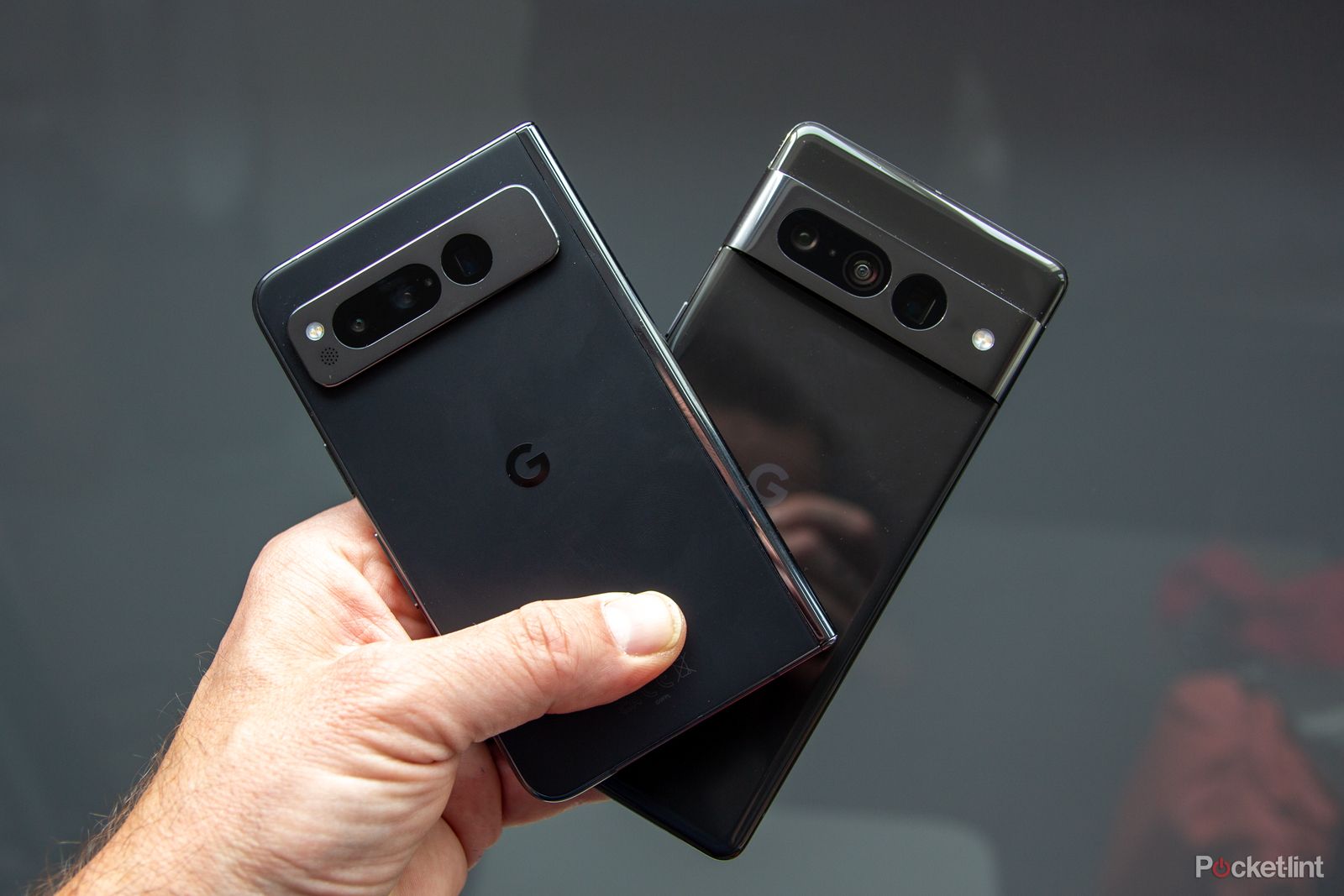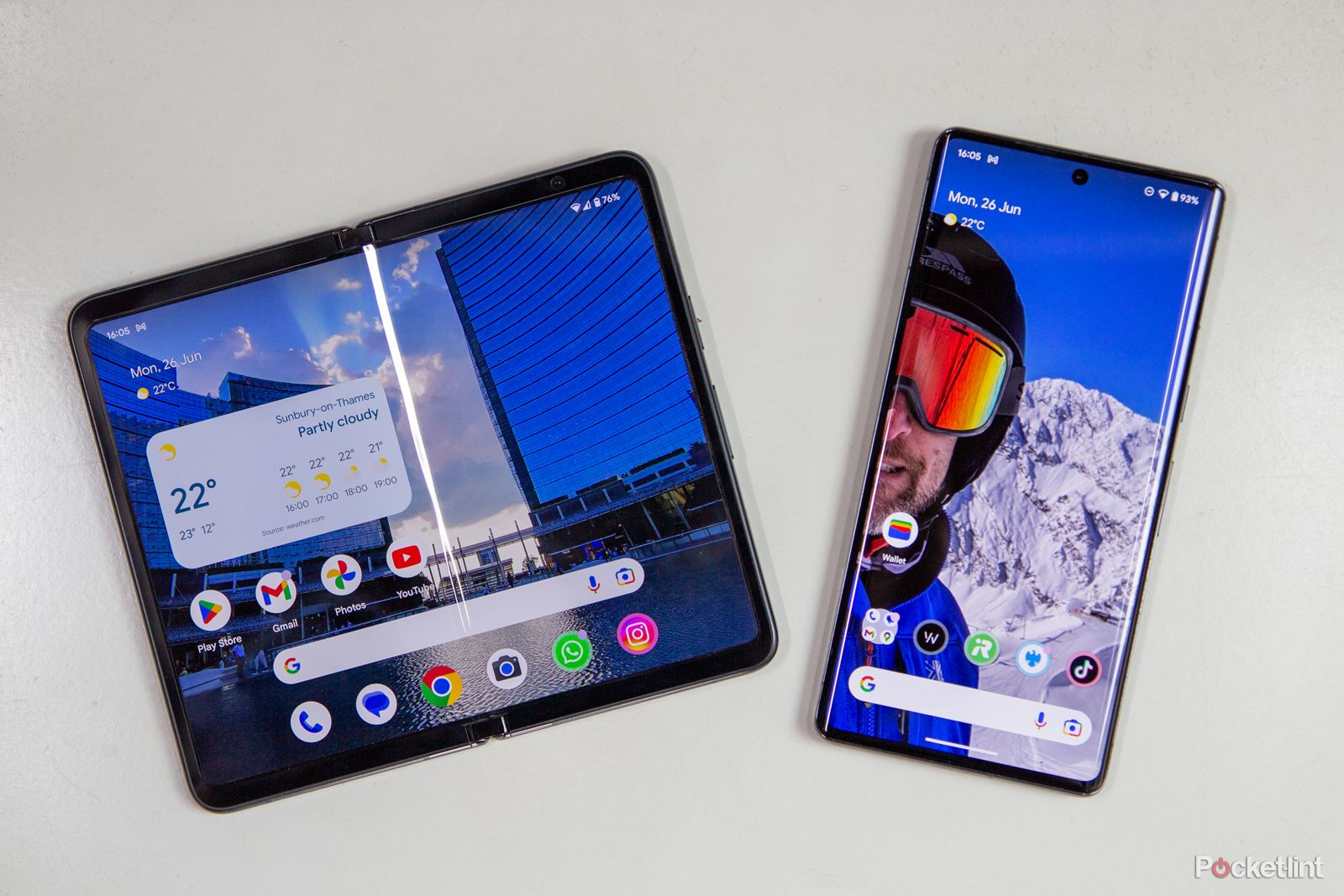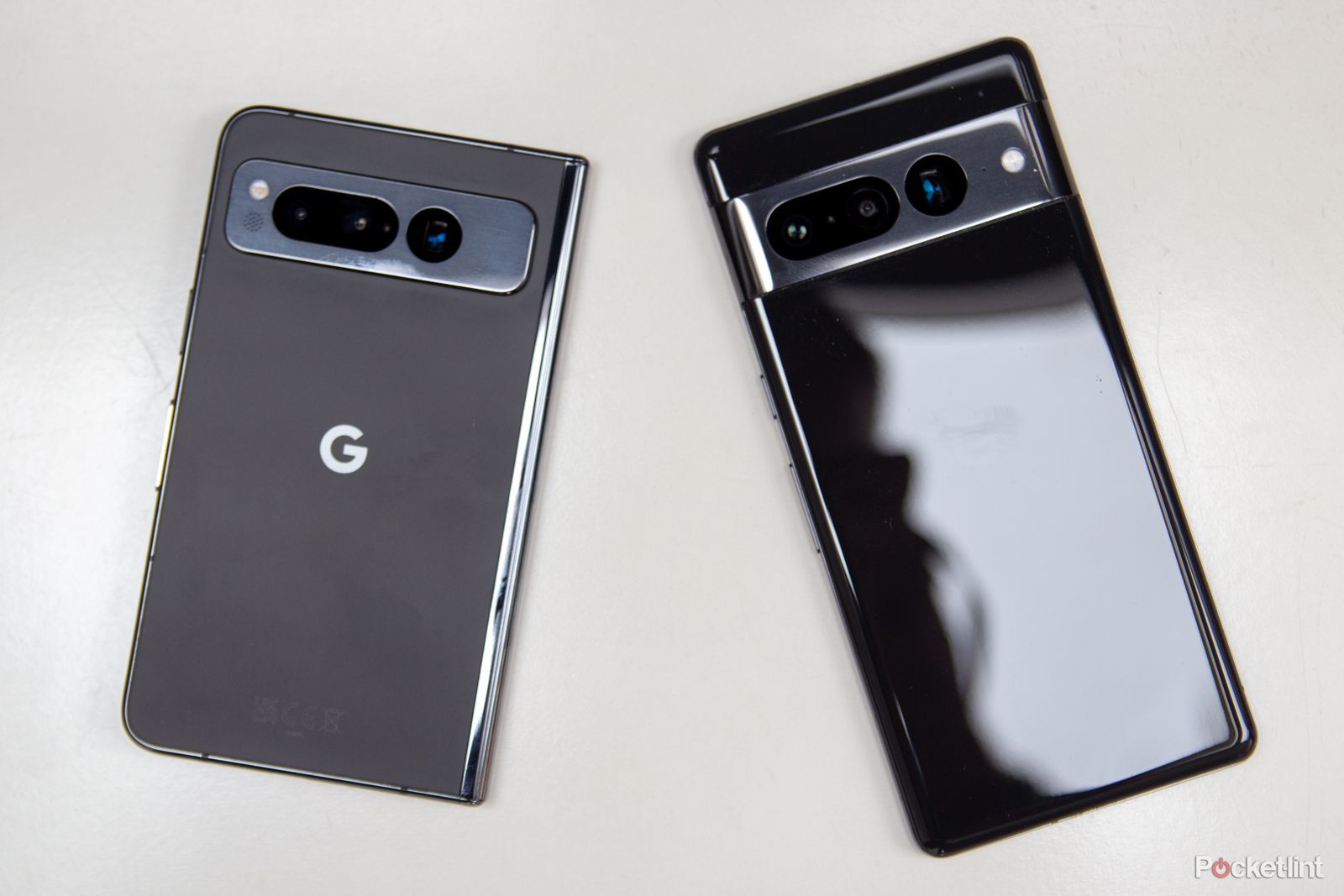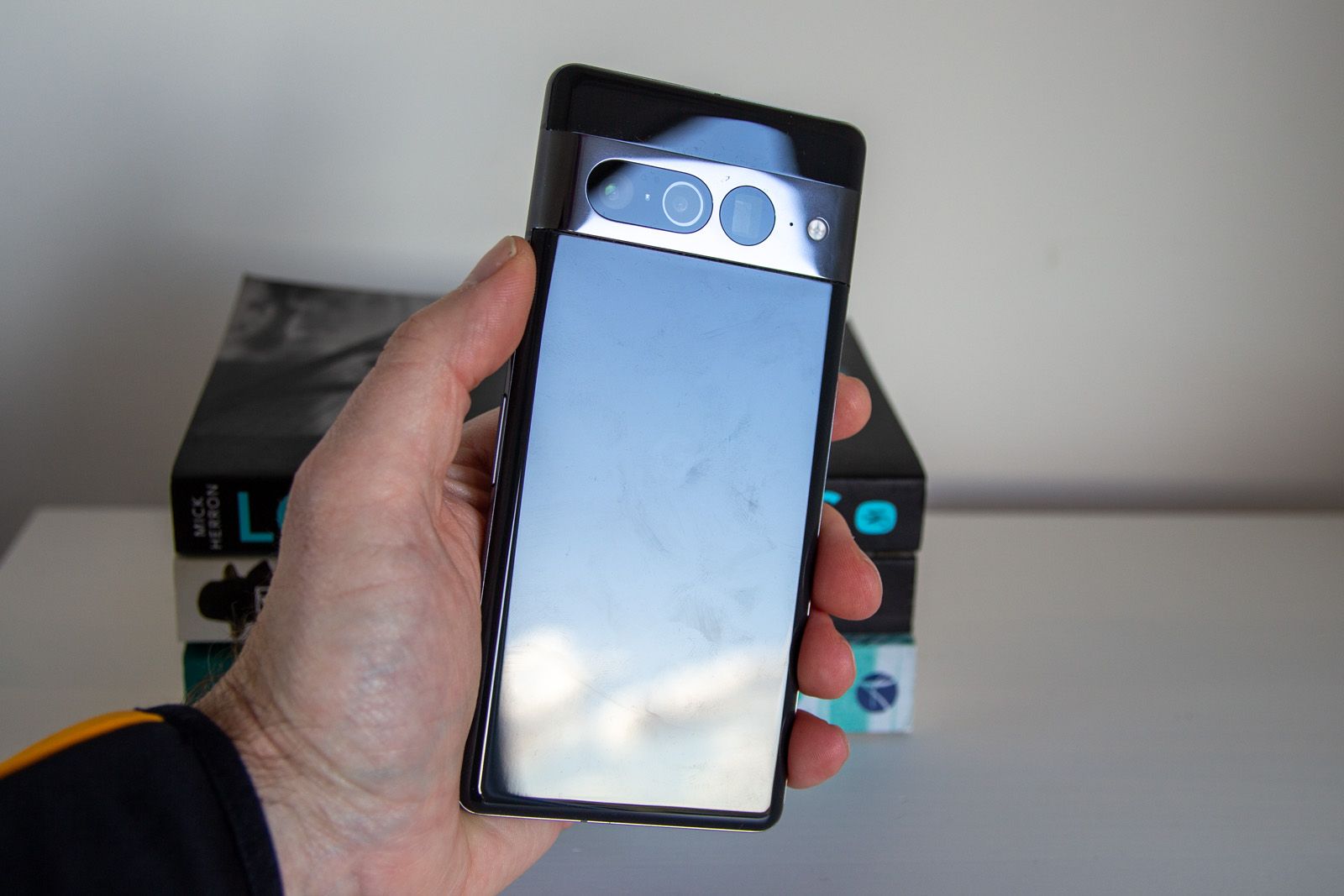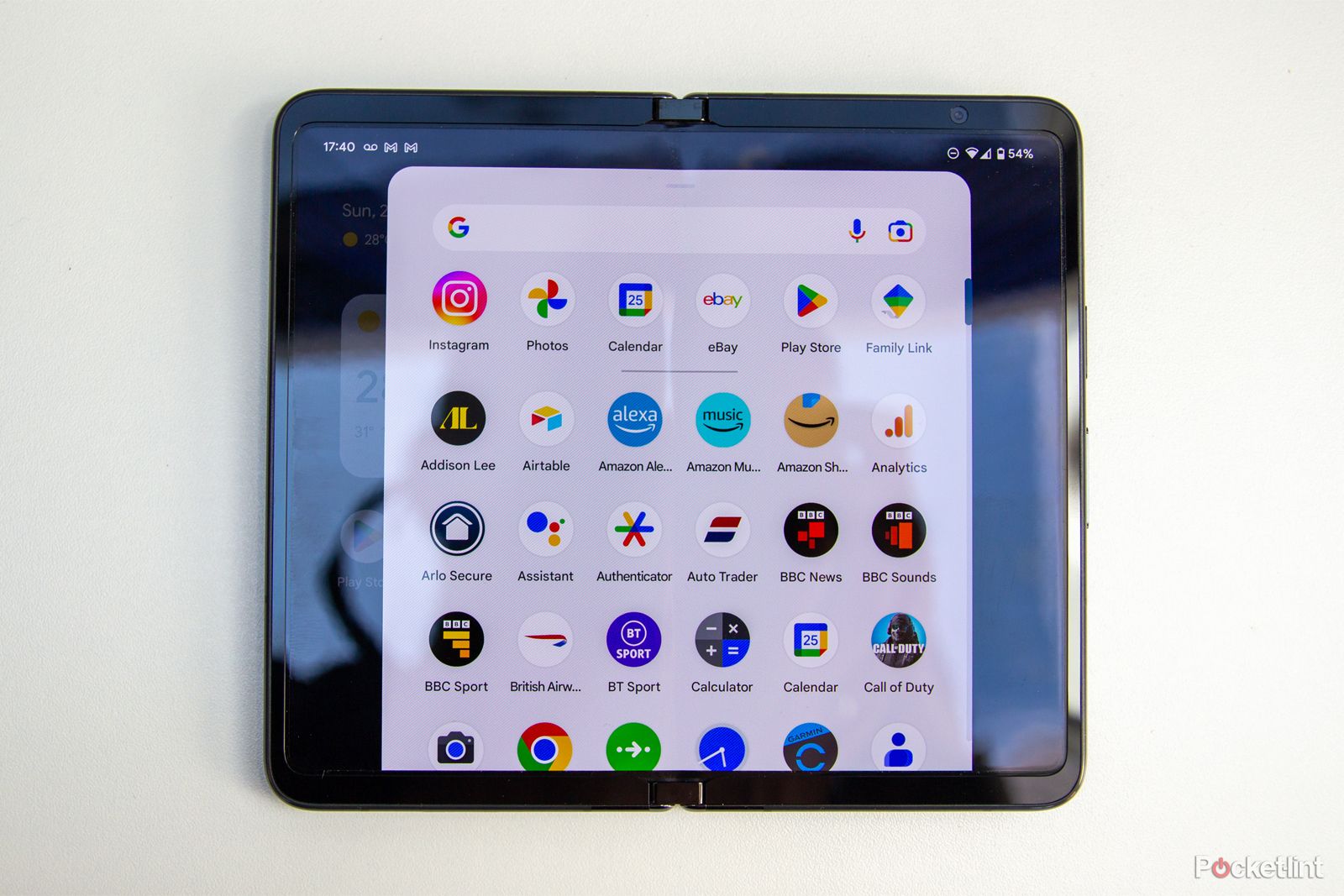-
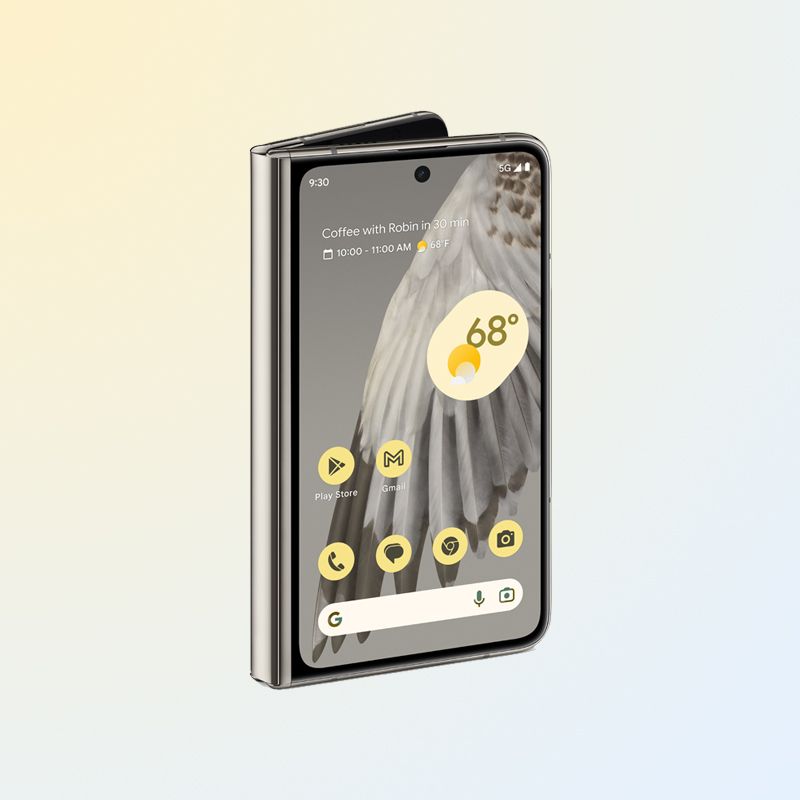
Google / Pocket-lint
Google Pixel Fold
The Google Pixel Fold is the company’s first folding phones, offering some great specs but at a very high price compared to the Pixel 7 Pro.
Pros- Great quality design
- External display is very useable
Cons- Software optimisation needed
- Expensive
-
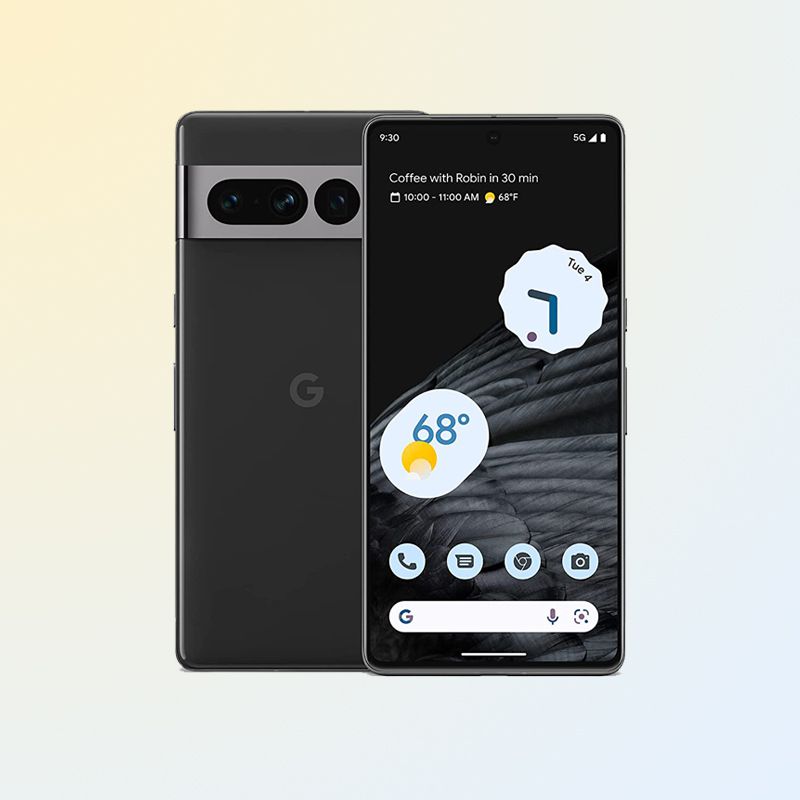
Google / Pocket-lint
Google Pixel 7 Pro
The Google Pixel 7 Pro builds on the foundation of the Pixel 6 Pro, offering a more refined design, stunning camera performance and clean software.
Pros- Great display
- Camera performance
Cons- Face unlock limited
- Not hugely different to Pixel 6 Pro
Google announced a couple of devices in May 2023, including the Pixel 7a, Pixel Fold and the Pixel Tablet. The Pixel Fold is the company’s first folding phone, taking some cues from the Pixel 7 and Pixel 7 Pro. If you’re in the market for a Pixel device though, which is the right one for you? We’ve compared the Pixel 7a to the Pixel 7 and Pixel 7 Pro in a separate feature, but here we are comparing the two flagship Pixel offerings: the Pixel 7 Fold and the Pixel 7 Pro. Should you Fold or go Pro?
Price, availability and specs
The Google Pixel 7 Pro is available globally in three colour options. It comes in Obsidian (black), Snow (white) and Hazel (grey), while the Google Pixel Fold only comes in two colour choices – Obsidian and Porcelain. Despite both models sitting in Google’s flagship smarpthone territory, there’s a huge price difference between them.
The Pixel 7 Pro starts at $899 in the US and £849 in the UK, while the Pixel Fold starts at $1800 in the US and £1799 in the UK, so you’re paying an extra $/£1000 for that folding format. There’s quite a big difference in their specifications too, not least because they take on different form factors. You can see a quick glance at how the specifications compare in the spec table below, though we have gone into more detail further down to help you understand the key differences between these two devices. Specs aren’t the entire picture after all.
-
Google Pixel Fold Google Pixel 7 Pro SoC Google Tensor G2 Google Tensor G2 Display 5.8-inch, OLED, 2092 x 1080, 120Hz (cover) / 6.7-inch OLED, UTG, 2208 x 1840, 120Hz (main) 6.7-inch, LTPO, Quad HD+, 120Hz, up to 1500nits Battery 4821mAh, 30W fast charging, Wireless charging 4500mAh, Fast charging, Wireless charging Operating System Android Android Front camera 9.5MP, f/2.2 (cover) / 8MP, f/2.0 (main) 10.8MP f/2.2 Rear cameras 48MP f/1.7 main, 10.8MP f/2.2 ultra-wide, 10.8MP f/3.05 telephoto 50MP f/1.9 main, 12MP f/2.2 ultra-wide, 48MP f/3.5 telephoto Dimensions 139.7 x 79.5 x 12.1mm (folded), 139.7 x 158.7 x 5.8mm (unfolded), 283g 162.9 x 76.6 x 8.9mm, 212g Colors Obsidian, Porcelain Snow, Obsidian, Hazel IP Rating IPX8 IP68 RAM and Storage 12GB, 256/512GB 12GB / 128, 256, 512GB
Design and build
The Google Pixel 7 Pro and the Google Pixel Fold are two completely different devices when it comes to their designs. The Pixel 7 Pro is a standard smartphone, competing with the likes of the Samsung Galaxy S23 Ultra, while the Pixel Fold is a book-style folding phone that competes with the likes of the Samsung Galaxy Z Fold 4.There are advantages to both form factors. The Google Pixel 7 Pro is lighter and more compact than the Google Pixel Fold, but you only get one screen.
The Pixel Fold meanwhile, delivers a lovely large exterior display but it also offers a huge main display when unfolded, allowing for multi-tasking, as well as watching movies, YouTube, or gaming for example.The Pixel Fold has a squarer screen real estate compared to the Pixel 7 Pro, which is taller and narrower, though both devices offer a horizontal camera housing on the rear that expands the width of the devices. The Pixel Fold’s housing doesn’t stretch all the way to the edge of the rear like the Pixel 7 Pro, but there’s a similar design language across both. Both devices have a glass rear, though where the Pixel 7 Pro is IP68 rated against water and dust, the Pixel Fold only offers IPX8. When it comes to other design details, the Pixel 7 Pro has a curved edge display, while the Pixel Fold’s is flat. Both have a centralised punch hole camera at the top, though.
On the inside, the Pixel Fold has slim bezels on the edges, but larger bezels at the top and bottom, accommodating the secondary front camera. Samsung opted for an under-display camera on its inside display, while Huawei opted for a punch hole camera in its Mate X3, though Google has chosen to place it in the bezel for the Pixel Fold.The Pixel Fold and Pixel 7 Pro both offer USB-C at the bottom, though while the Pixel 7 Pro has an under-display fingerprint sensor, the Pixel Fold opts for a physical fingerprint sensor on the right edge.
Display
The Google Pixel 7 Pro has a 6.7-inch LTPO OLED display as its main screen and as we mentioned, there’s only one display on offer here. It has a Quad HD+ resolution at 3120 x 1440 pixels that delivers a pixel density of 512ppi, and it offers a 19.5:9 aspect ratio with up to 120Hz refresh rate. Corning Gorilla Glass Victus protects the screen and there’s not only HDR support, as you would expect, but you will also find up to 1000nits HDR brightness and up to 1500nits peak brightness. It’s an excellent display, with great colour representation and good viewing angles.The Pixel Fold has a 5.8-inch exterior display, which is wider than the Pixel 7 Pro’s screen with an aspect ratio of 17.4:9 and smaller too, of course. There’s a Full HD+ resolution on offer, with 2092 x 1080 pixels, which delivers a pixel density of 408ppi, so not quite as sharp as the 7 Pro, though you will find HDR support, along with Corning Gorilla Glass Victus protection.
The exterior display is slightly brighter than the Pixel 7 Pro, with a 1200nits HDR brightness and a 1550nits peak brightness, though it’s unlikely you would notice this difference unless you had the two devices side-by-side. It is a fabulously large display though with a great screen-to-body ratio. Of course, the Pixel Fold has a secondary main display when open too, which is a 7.6-inch screen. This has a 6:5 aspect ratio, making it more rectangular when open than what you would find on the Samsung Galaxy Z Fold 4, for example. It has a resolution of 2208 x 1840 pixels, which delivers a pixel density of 380ppi and it has an Ultra Thin Glass (UTG) layer, allowing it to fold.
Like the exterior display, the Pixel Fold’s interior screen supports HDR. There’s up to 1000nits HDR brightness and up to 1450nits peak brightness.The Pixel 7 Pro’s display, as well as the two displays on the Pixel Fold all offer Google’s Always-on display with At a Glance and Now Playing features. All three displays also offer up to 120Hz refresh rates too, allowing for smooth scrolling.
Hardware and specs
Under the hood, the Google Pixel 7 Pro and the Google Pixel Fold run on the same chipset, which is the in-house Google Tensor G2 platform. This is supported by the Titan M2 security coprocessor and the same security features are on board both devices, including VPN by Google One, multi-layer hardware security and a minimum of five years of security updates.The Pixel 7 Pro comes with 12GB of RAM and it is available in storage options of 128GB, 256GB and 512GB, none of which offer microSD support for storage expansion. The Pixel Fold meanwhile, also offers 12GB of RAM, though storage options are only 256GB and 512GB, which isn’t all that surprising given the cost.
Once again though, there is no microSD support for storage expansion.When it comes to battery capacities, the Google Pixel 7 Pro has a 5000mAh battery under its hood, while the Pixel Fold has a 4821mAh battery running the show. Keep in mind that while they aren’t too far off each other in terms of capacities, the Pixel 7 Pro is likely to deliver better performance as it’s only running one display rather than two, and we would also expect things like multi-tasking on the Pixel Fold to use up quite a bit of power. Both the Pixel 7 Pro and the Pixel Fold support up to 30W fast charging, along with wireless charging. The Pixel 7 Pro also supports Battery Share, which is reverse wireless charging, allowing you to charge other Qi-certified devices from it. The Pixel Fold doesn’t offer that, though that’s not necessarily a deal breaker.
Cameras
Both the Google Pixel 7 Pro and Pixel Fold have a triple lens camera system on the rear, but they offer a different make-up. The Google Pixel 7 Pro has a 50-megapixel main camera with 1.2µm pixels and a f/1.85 aperture. This is supported by a 12-megapixel ultra wide camera with 1.25µm pixels and a f/2.2 aperture, and a 48-megapixel telephoto lens with 0.7µm pixels and f/3.5 aperture. There’s 5x optical zoom and 30x Super Res Zoom and the results delivered are excellent.The Pixel Fold meanwhile, has a 48-megapixel main sensor with 0.8µm pixels and a f/1.7 aperture, coupled with a 10.8-megapixel ultra wide sensor with 1.25µm pixels and a f/2.2 aperture. There’s also a 10.8-megapixel telephoto lens that has 1.22µm pixels and a f/3.05 aperture, which delivers 5x optical zoom like the Pixel 7 Pro, but 20x Super Res Zoom.
We’re still testing the Pixel Fold’s camera so we’re still deciding how it compares to the Pixel 7 Pro in terms of results, though Google has a good reputation in this department so we’re not too worried. The same features are on board too, including Magic Eraser, Night Sight, Photo Unblur and Portrait Mode. On the front, the Pixel 7 Pro has a 10.8-megapixel front camera with 1.22µm pixels and f/2.2 aperture. The Pixel Fold meanwhile, has a 9.5-megapixel front camera with 1.22µm pixels and f/2.2 aperture on the exterior, while the inner display has an 8-megapixel sensor with 1.12µm pixels and f/2.0 aperture.In terms of video recording capabilities, the Pixel 7 Pro and Pixel Fold both offer 4K video recording at up to 60fps from both the front and rear cameras. The Pixel Fold only has 1080p video recording at 30fps from the inner front camera though so keep that in mind.
Software
Both the Google Pixel 7 Pro and the Google Pixel Fold run on stock Android with no bloatware, so you’ll get a great experience from both devices and a similar one too. The Pixel Fold does have a couple of extra features on top of the Pixel 7 Pro however, due to its format. For example, the hinge design means you’ll be able to sit the Pixel Fold at an angle in Tabletop Mode order to watch a movie on Netflix or YouTube, and there are multi-tasking features too. You can have two apps running side-by-side on the Pixel Fold’s inner display with the Split Screen mode, which will then allow you to drag and drop images, videos, links, and text from one app to another.In terms of other features though, there are many of the same features on board both models, like Face Unlock so while the Pixel Fold has a few extras thanks to the additional inner display, the overall experience between the Pixel 7 Pro and Pixel Fold is the same.
Conclusion
It depends on what you are looking for from your device as to whether the Google Pixel 7 Pro or the Pixel Fold is the right device for you. There’s a huge price difference so you have to really want a folding phone to opt for the Pixel Fold, though if you do, it offers some great specs, including the same hardware platform as the Pixel 7 Pro and of course that additional larger display and extra multitasking features.
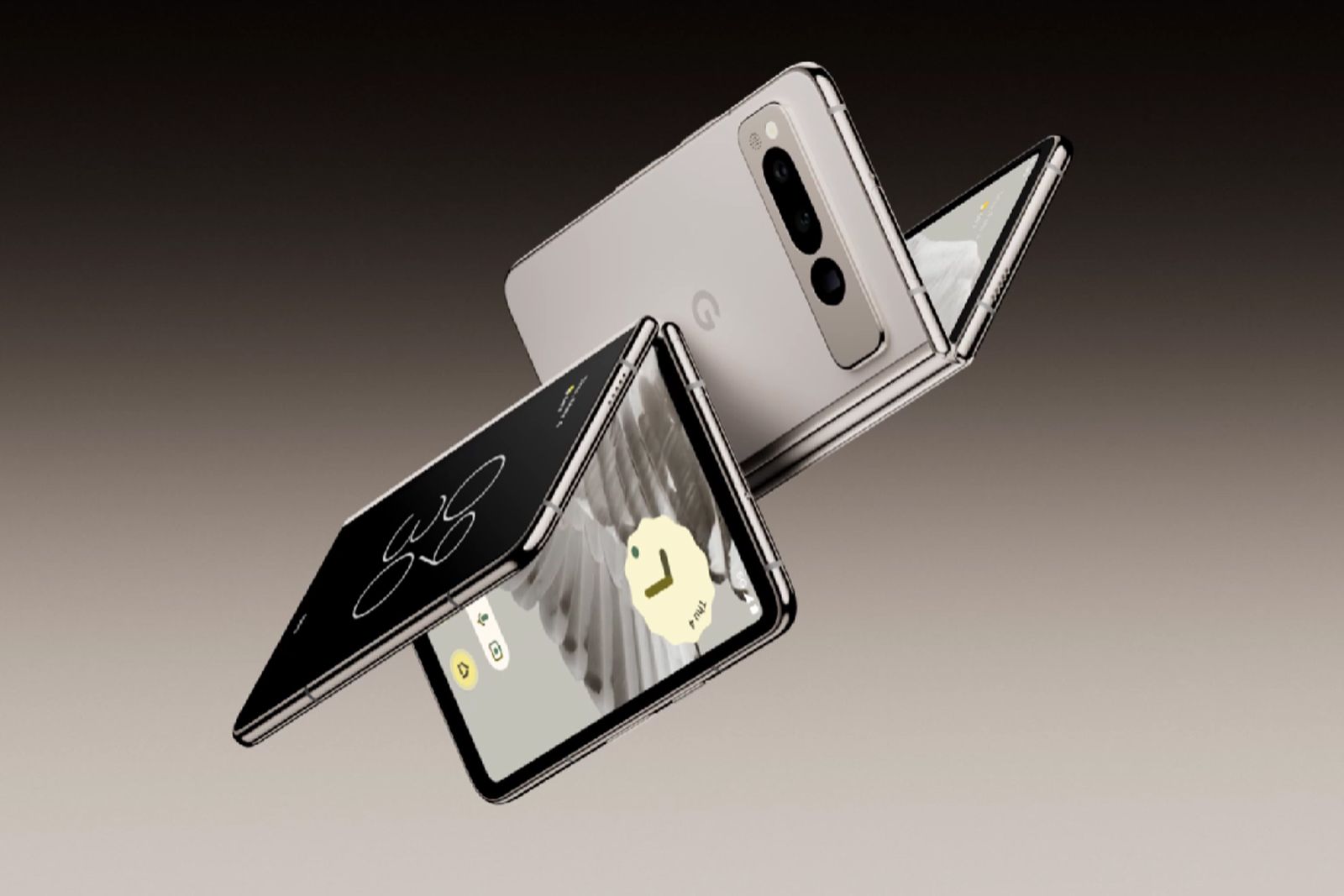
Google Pixel Fold
The Google Pixel Fold is the company’s first folding phones, offering some great specs but at a very high price compared to the Pixel 7 Pro.
The Pixel 7 Pro is an excellent device, with a superb camera offering and software experience, and it’s excellent value for money too. We’re still running the Pixel Fold through its paces to determine whether it’s a good buy, though in terms of specs themselves, you’re getting a similar offering between the Pixel 7 Pro and the Pixel Fold.The question remaining is, do you want a folding phone enough to spend more than double the amount on it compared to a standard, but brilliant, flagship Pixel?
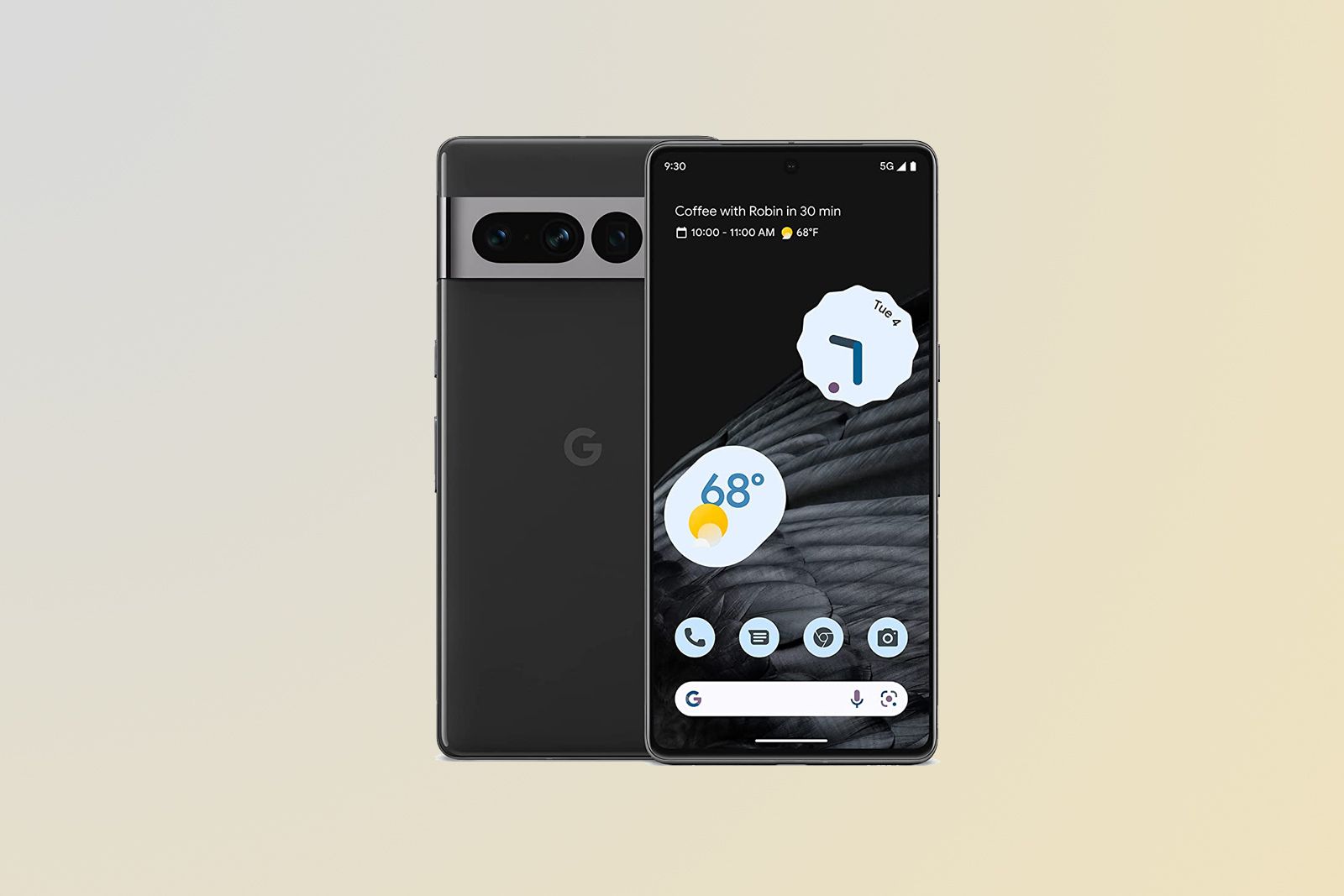
Google / Pocket-lint
Google Pixel 7 Pro
The Google Pixel 7 Pro builds on the foundation of the Pixel 6 Pro, offering a more refined design, stunning camera performance and clean software.
Credit : Source Post
